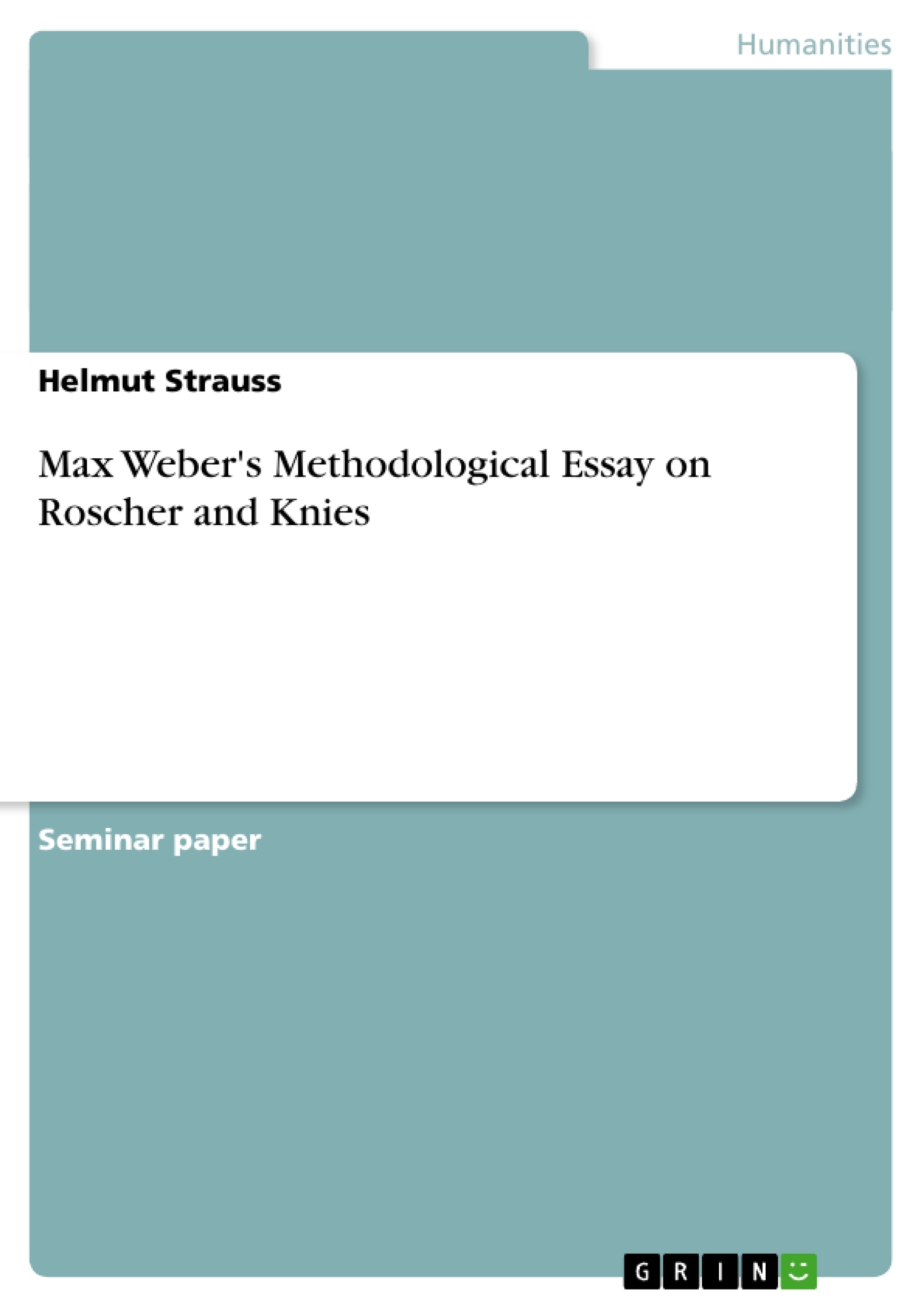I. Introduction
In 1902, a new phase in the scientific production of Max Weber began. Still suffering from his breakdown in 1898 which forced him to refrain from any intellectual work for several years, Weber started working on a different field of interest than before his crisis; he focused on methodological issues.
Weber had, already at the age of thirteen, actually written an essay which touched upon fundamental questions of the philosophy of history, like establishing of “laws of history”. The occasion on which Weber started writing his academic methodological works was a request by his colleagues at the University of Heidelberg to contribute an essay for a Festschrift of the university.
“Roscher und Knies und die logischen Probleme der historischen Nationalökonomie” was the first of the methodological essays written by Max Weber from 1902 on.
The value of Max Weber’s methodological essays was often underestimated. In Reinhard Bendix’s “Intellectual Portrait” e.g. they are “intentionally” left out in favor of Weber’s empirical work . Oakes even judges Weber’s metatheoretical project as a failure because of a lack of examination, understanding and evaluation on the part of his successors. In this paper, I am going to focus on the Weber’s essay on “Roscher and Knies” as a primary source, because the conclusions reached by Weber here are premises for his later methodological work. My aim is not to give a comprehensive analysis of this essay, but rather an overview of central points in Weber’s concept.
As secondary literature, I shall use Oakes “Introductory essay” to the “Roscher and Knies” essay, Toby Huff’s study in Weber’s methodology and for the biographical context, parts of Marianne Weber’s biography of her husband.
First of all, I shall look at the Methodenstreit in the German sciences which constituted the intellectual context inspiring and -in a way- provoking Weber. Secondly, I shall examine his critiques both of the ‘naturalist’ and of the ‘intuitionist’ positions and also take Weber’s remarks on ‘irrationality’ into account.
Then, I shall try to reconstruct the main thoughts of Weber’s own concept as it is shown in his rejection of Wundt’s category of ‘creative synthesis’ and in his theory of ‘causal explanation and meaningful interpretation’.
After a short summary of Weber’s ideas, I shall conclude with the attempt to show the importance of Weber’s methodological concept for the theory of history. [...]
Inhaltsverzeichnis (Table of Contents)
- I. Introduction
- II. The Methodenstreit
- III. 1. Weber's Critique of the Naturalist Position
- III. 2. Weber's Critique of Intuitionism
- III. 3. The Problem of ‘Irrationality'
- IV. 1. The Category of “Creative Synthesis”
- IV. 2. Causal Explanation and Meaningful Interpretation
- V. Summary
- VI. Conclusion
Zielsetzung und Themenschwerpunkte (Objectives and Key Themes)
This paper focuses on Max Weber's essay on “Roscher and Knies” to illustrate his methodological approach. The paper aims to provide an overview of Weber's key arguments and demonstrate the importance of his methodological concepts for the theory of history.
- The Methodenstreit in German sciences and the debate surrounding the applicability of natural scientific methods to the sociocultural sciences.
- Weber's critique of both the ‘naturalist' and the ‘intuitionist' positions in the Methodenstreit.
- Weber's concept of 'causal explanation and meaningful interpretation' as an alternative to the ‘naturalist' and ‘intuitionist' approaches.
- The role of 'irrationality' in social phenomena and its significance in understanding historical events.
- The importance of Weber's methodological framework for the study of history.
Zusammenfassung der Kapitel (Chapter Summaries)
- I. Introduction: The introduction provides context for Weber's methodological essay, highlighting his personal and intellectual trajectory. It discusses the historical background of the essay and outlines the paper's focus on central points in Weber's concept.
- II. The Methodenstreit: This section delves into the ‘struggle of methods' among German scientists in the 1880s. It discusses the debate surrounding the applicability of natural scientific methods to the sociocultural sciences, including the ‘naturalist' and ‘intuitionist' positions.
- III. 1. Weber's Critique of the Naturalist Position: This section presents Weber's rejection of the ‘naturalist' goal of establishing a coherent system of general “laws” in the sociocultural sciences. Weber argues that while empirical generalizations are valuable, they cannot be used to deduce historical reality or provide adequate explanations.
Schlüsselwörter (Keywords)
The central keywords and focus topics of this text include: Max Weber, Methodenstreit, naturalism, intuitionism, causal explanation, meaningful interpretation, irrationality, historical economics, methodological essays, ‘Roscher and Knies’, theory of history, ‘laws of history’, verstehen, sociocultural sciences, and empirical generalizations.
- Quote paper
- Helmut Strauss (Author), 2004, Max Weber's Methodological Essay on Roscher and Knies, Munich, GRIN Verlag, https://www.hausarbeiten.de/document/24996



